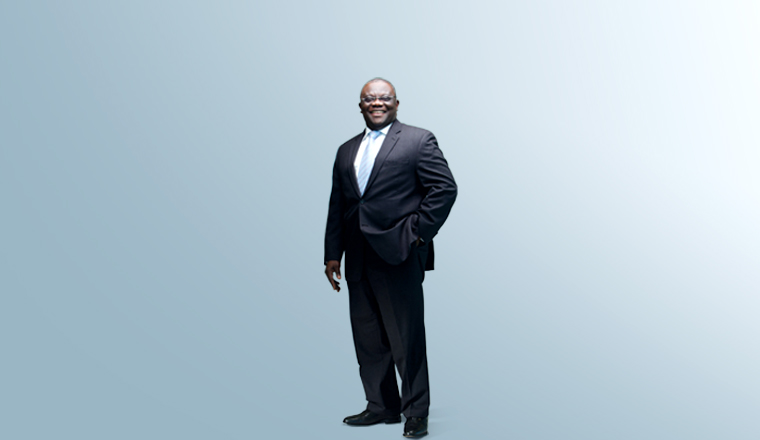Published: March 25, 2015
As Albert Essien prepares to step down as Ecobank’s chief executive, he tells Tim Burke the bank will remain an independent African institution.
During 25 years with Ecobank, Albert Essien (pictured) has been responsible for taking the group into many of its African markets and most of its international ones. It’s been a “fulfilling, challenging but fruitful career”, Essien says, culminating in his appointment last March as chief executive. But at the age of 60, he’ll step down at the bank’s annual general meeting in the early summer, and he’s now thinking about the business he leaves to his successor, yet to be named.
“The important thing is to get a good person, better than me, to move the group to the next level,” he tells EMEA Finance during a visit to London in early 2015. He adds: “We need to have a better use of our footprint, in terms of cross-border trade, payments, collections. We spent some money on technology, and we should make sure that technology spend is translated into higher productivity, efficient delivery of services and products. We have a big footprint, but so what? The important thing is that the footprint is used to post better returns for shareholders.”
Essien joined the corporate banking department of Ecobank Ghana back in 1990, rising through the ranks to become managing director in 2002. In 2005 he was tasked with supervising the bank’s businesses in the West African monetary zone, overseeing Ghana, Liberia and Guinea and opening divisions in Sierra Leone and Gambia.
Still in that role, he was asked to help Ecobank expand in east and southern Africa, and took the bank into Kenya, Rwanda, Burundi, Malawi, Zambia, Uganda and Tanzania. He opened the representative office in South Africa, becoming the chief rep for the country in 2008, and helped to negotiate Ecobank’s alliance with South Africa’s Nedbank, which today is its largest shareholder. Internationally he helped open offices in the UK, China and Dubai. In 2012 he was named deputy CEO.
His appointment as CEO in 2014 came under difficult circumstances – his predecessor, Thierry Tanoh, left the bank after months of accusations over corporate governance breaches. Taking the post, Essien said the bank faced “challenges at the governance level in the recent past” but added that “they are not insurmountable”. (As EMEA Finance went to press, Ecobank was appealing court decisions in Côte d’Ivoire and Togo to award more than US$26mn to Tanoh in damages. In a statement, Ecobank said its team was “confident about the robustness and merits of these appeals, and feels assured that the higher courts will ultimately uphold them”.)
The Governance Action Plan signed off by the board that month started the process of reassuring the markets that Ecobank was being run properly. “I took over at a difficult time when confidence had gone down,” Essien recalls. “As the leader, you need to show the way. You need to be seen to be credible, to have candour, to be professional. You say yes, we’ve found ourselves in this hole. We’ll get out of this hole and here’s how we’ll get out.”
Ecobank’s problems appear to have done little to discourage investors. Last year Qatar National Bank (QNB) took a stake in the group, saying the investment was a key part of the management team’s plans to make QNB a “Middle East and Africa icon” over the course of the next four years. Following that investment, Nedbank increased its own holding in Ecobank. Today the South African bank holds 20% of Ecobank’s shares, while QNB holds 19%.
Last year’s investments led to industry chatter that Ecobank could become the target of a full takeover approach from Nedbank or QNB. Essien is adamant that won’t be the case.
“We are not and will not be a takeover target,” he says when the issue is raised. “We will stay an independent African institution. Yes, we welcome shareholdings from reputable institutions, and we are happy that we could attract Nedbank as a shareholder and Qatar National Bank as a shareholder. But we will stay independent.”
He adds: “Both [QNB and Nedbank] recognise that they need to work together to make sure that Ecobank is strengthened, is more profitable and gives them a good return. I don’t think they would do anything that would put that in jeopardy. They’ve invested a good amount of money.”
Essien isn’t slowing down as he approaches his retirement in June. The bank’s internal controls still need tightening, he notes, and risk management needs strengthening. Costs need to be under control. Growing competition in several of the bank’s key markets is keeping the Ecobank team on its collective toes.
But come the second half of the year, someone else will step up to the challenge of facing these issues. Essien, meanwhile, will be sleeping more, he says with a laugh. He also hopes to work as an adviser to other firms – “I want to share my knowledge with other institutions, especially those that want to be Africa focused” – and, back home in Ghana, simply to “spend more time with family and loved ones – and also play more golf”.


